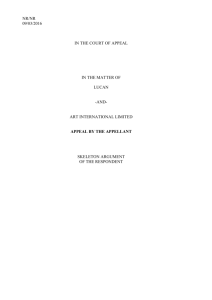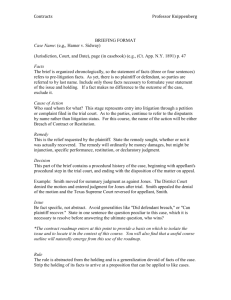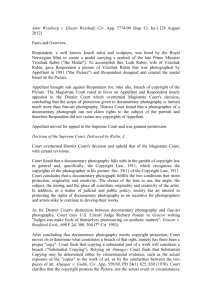AUGUST 2012 HOOHLO VS HOOHLO
advertisement
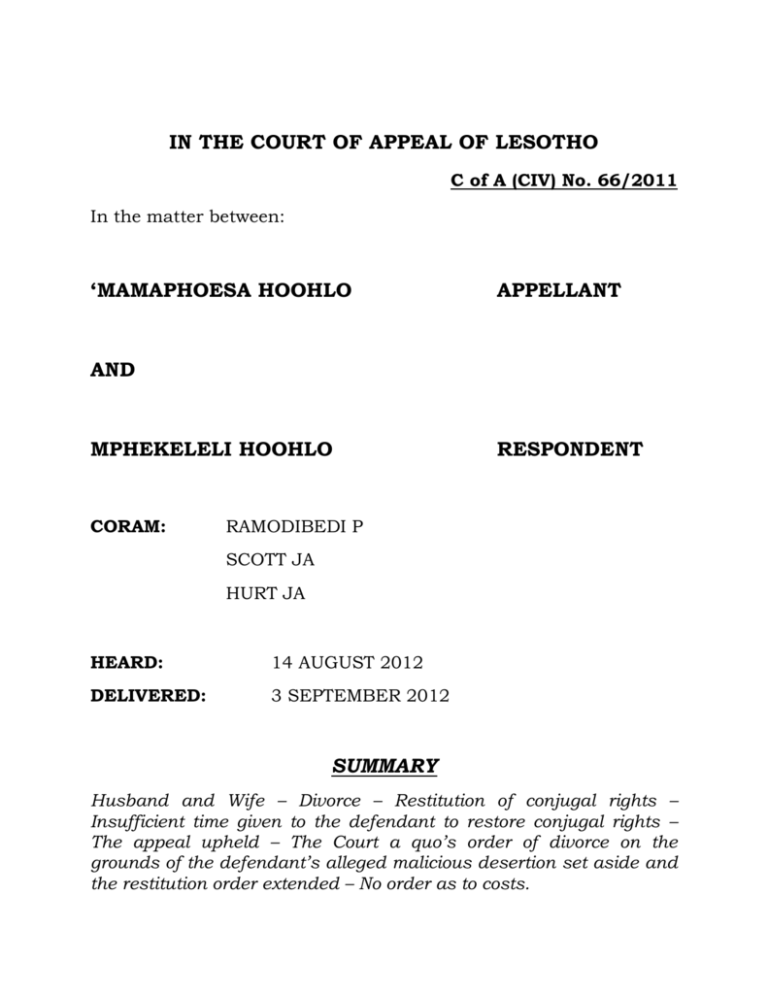
IN THE COURT OF APPEAL OF LESOTHO C of A (CIV) No. 66/2011 In the matter between: ‘MAMAPHOESA HOOHLO APPELLANT AND MPHEKELELI HOOHLO CORAM: RESPONDENT RAMODIBEDI P SCOTT JA HURT JA HEARD: 14 AUGUST 2012 DELIVERED: 3 SEPTEMBER 2012 SUMMARY Husband and Wife – Divorce – Restitution of conjugal rights – Insufficient time given to the defendant to restore conjugal rights – The appeal upheld – The Court a quo’s order of divorce on the grounds of the defendant’s alleged malicious desertion set aside and the restitution order extended – No order as to costs. JUDGMENT RAMODIBEDI P [1] The appellant’s main complaint in this appeal is directed against the decision of the High Court granting divorce to her husband, the respondent, on the ground of malicious desertion. [2] It is appropriate to commence this judgment with a regrettable observation that in recent years it has become evident that some trial judges in this jurisdiction are increasingly becoming trigger happy, if I may respectfully be permitted to put it that way, in granting divorce at the slightest opportunity. See for example, such cases as ‘Mantseli Matekane v Pusetso Matekane C of A (CIV) No.32/09; Tau Malebo v ‘Mankitsing Malebo C of A (CIV) No.34/09. This new approach is in my view, inconsistent with the cherished principle of respect by the courts for the sanctity of marriages. [3] The parties in this dispute were married to each other by civil rites on 4 July 2007 at St. Monica’s in the District of Leribe. There is one child born of the marriage, namely, ‘Malomile Hoohlo. [4] It requires to be observed at the outset that the marriage between the parties has this peculiarity about it. It is common cause that the parties have never lived together as husband and wife. Nor do they have a marital home of their own. It is thus curious for the respondent to have included the following paragraph in his declaration:- “5.3 the defendant (now the appellant) left the matrimonial home without justifiable cause and continues to reside and abode at her maiden home without the consent of the plaintiff.” [5] The truth of the matter, however, is that on 7 July 2007, after the solemnisation of the marriage the respondent took the appellant to his parental home at Roma in Maseru District. The young couple stayed there together. However, the respondent soon left for Johannesburg in South Africa to look for a job, which he finally obtained at Absa Capital Bank. [6] Meanwhile, it is common cause that at the material time in question the appellant was employed at Nedbank Lesotho in Maseru. She resided at Maseru West. [7] On 14 March 2008, the respondent filed a divorce action against the appellant on the ground of malicious desertion. He relied principally on what he termed irretrievable breakdown of marriage. In my view, he was ill-advised to seek to rely on that ground since it is not a ground for divorce, as the law presently stands in this jurisdiction. As this Court said in Matekane’s case, supra, our common law recognises only two grounds of divorce, namely, (1) adultery and (2) malicious desertion. [8] On 1 April 2010, the respondent obtained a restitution order by default. The order was in these terms:- “The defendant is ordered to restore conjugal rights to the plaintiff on or before the 15th April 2010, failing compliance therewith to show cause on the 28th April 2010, why a decree of divorce shall not be granted on the grounds of defendant’s malicious desertion.” Surprisingly, the order was only filed of record on 7 April 2010. [9] Crucially, the appellant is unchallenged in her version that she only came to know about the restitution order in question on 15 April 2010 at 4:39pm when the Deputy Sheriff served it on her at work. Realising that she only had 21 minutes left within which to restore conjugal rights, she then telephoned her attorneys. Apparently acting on legal advice, she proceeded to restore conjugal rights at Roma, being “the last known address of the plaintiff.” She was accompanied by the Deputy Sheriff, something that would seem to support her genuineness to restore conjugal rights on its own. Otherwise there would have been no point in going to the trouble of roping in the Deputy Sheriff if she was not genuine about restoring conjugal rights. [10] In an unusual turn of events, each party filed an affidavit in respect of the restitution order. The appellant on the one hand filed an affidavit of return. The respondent on the other hand filed an affidavit of nonreturn. The versions contained in the two affidavits were mutually destructive. Hence the trial court ordered viva voce evidence. It also correctly made a ruling, in my view, that the appellant bore the onus of proof to show that she had restored conjugal rights. [11] The appellant was unchallenged in material respects in her evidence. Crucially, the learned trial judge made no credibility findings against her. In a nutshell, she testified that after the solemnisation of the marriage, the couple stayed at the respondent’s parental home. They stayed in the same house with the latter’s parents, a recipe for disaster as it often happens in such situations. [12] The appellant confirmed that after belatedly receiving the restitution order, she sought legal advice. Her understanding was that this was “an order compelling me to go to the matrimonial home of my husband.” After receiving legal advice, she requested the Deputy Sheriff “to accompany me to my matrimonial home” at Roma. As will be recalled, this was in fact the respondent’s parental home. The Deputy Sheriff obliged. He duly accompanied the appellant to Roma. She entered the house. She found the respondent’s mother inside the house. She greeted her and explained to her “what has brought me there.” She says that at that moment the respondent’s mother went berserk. She shouted at her, telling her that the respondent was not staying there and that the appellant had caused her so much trouble. She added, for good measure, that the appellant should get out of her son’s life. Finally, she expelled both the appellant and the Deputy Sheriff from the house. [13] The appellant stressed in her evidence that she was on good terms with her husband. She loved him. The latter’s mother was, however, the moving spirit in wrecking the marriage. She pleaded for an opportunity to live with her husband away from the clutches of the mother. She testified that she tried by all means to go back to her husband but in vain. All she knew was that he worked and lived somewhere in Johannesburg. But she did not know the exact address. [14] The respondent in turn testified that the appellant failed to restore conjugal rights to him. He blamed the appellant’s father for his marital problems with his wife. He testified that he lived in North Rooderpoort. He, however, did not mention the exact address. [15] The respondent further testified that he no longer loved the appellant. If that is so, it may well explain the apparent lack of communication between the two of them. Be that as it may, however, it is apparent from the respondent’s evidence that he has not ruled out reconciliation between himself and the appellant. In this regard he said the following on page 154 of the record of proceedings:- “Even before I came in to this Court we had some conversation trying to sort out some kind of reconciliation so that our child would have an upbringing healthy life” (sic). Similarly, on page 162 of the record the respondent testified as follows:- “To begin with I have frequently visited her (the appellant’s) place of residence with a proper attitude. My last encounter was at her place of residence not to mention that wasn’t only at her place of residence to see a child and there to also be with her and try to solve things [given] that she had walked out on me.” [16] In paragraph [5] of its judgment, the trial court correctly accepted that the parents of both parties “made it difficult for Mr and Mrs Hoohlo to reconcile.” [17] On the issue of the restitution order, the trial court appeared to accept in paragraph [7] of its judgment that the appellant made an attempt to restore conjugal rights to the respondent. However, the court held that “there was no seriousness.” It is incomprehensible to me how the court could have judged the genuineness of the appellant within the limited time between the service of the restitution order and its expiry. As will be recalled, the order required the appellant to restore conjugal rights on or before 15 April 2010. She was only served with the order 21 minutes before the deadline. Clearly, there was insufficient time given to the appellant to restore conjugal rights. Faced with this dilemma, an application was made on the appellant’s behalf to extent the restitution order. However, the trial court refused it. In doing so it said the following in paragraph [9] of its judgment:- “[9] I refused to re-issue a restitution order. This marriage must be dissolved……” [18] I have no hesitation in concluding that the trial court misdirected itself in refusing to extend the restitution order in the particular circumstances of this case as fully highlighted above. The very fact that the appellant was only served with the restitution order 21 minutes before the deadline cried out for an extension of the order. This is in keeping with respect for the sanctity of marriage. [19] A reading of the trial court’s judgment shows that the application for the extension of the restitution order was refused on the basis that the marriage had become “a hollow shell.” The learned Judge felt that there would be no point in prolonging the agony of the parties.” In my view, this was a misdirection. The issue before the court at that stage was not whether or not the marriage was a hollow shell. Instead, the real issue was whether or not the appellant had restored conjugal rights, a matter which could not properly be judged over a period of 21 minutes. It seems that the court was determined to grant a divorce at all costs. In my view this was a wrong approach. I am mainly attracted by the following apposite remarks in Vermaak v Vermaak 1965 (1) SA 341 (N) at 345:- “Bearing in mind the proper function of a restitution order and that the granting of a divorce ‘is a matter of public policy and that the policy of the Courts it to uphold the sanctity of marriage and not lightly to put an end to what is the very foundation of the most important unit of our social structure, the family’ (per HOEXTER, J.A., in Belfort v Belfort, 1961 (1) SA 257 (A.D), it seems to me that where a Court on the return day has to determine whether or not the defendant is contumacious in his attitude it would be artificial to make the result depend solely on the incidence of onus. The circumstances may be such that it would be more desirable to give a further opportunity to the parties to consider the position.” This is undoubtedly such a case. It is therefore, just and proper to extend the restitution order. In doing so, the appellant must realise that a restitution order entails more than just presenting herself to the physical address of the respondent. There must be proper communication such as through the parties’ attorneys as well as by email. Furthermore, it would make no sense for the appellant to insist on restoring conjugal rights at Roma. She must now accept the reality that the respondent works and lives in Johannesburg. The respondent too, must be prepared to receive the appellant if he is to avoid being labeled the deserter himself. [20] In the result the appeal is upheld. The following order is made:- (1) The restitution order granted by the High Court is set aside and replaced with the following order:- “The defendant must restore conjugal rights to the plaintiff on or before the expiry of six (6) months from today, that is to say, on or before 4 March 2013.” (2) There shall be no order as to costs. __________________________ M.M. RAMODIBEDI PRESIDENT OF THE COURT OF APPEAL I agree: ___________________________ D.G. SCOTT JUSTICE OF APPEAL I agree: ____________________________ N.V. HURT JUSTICE OF APPEAL For the Appellant : Mrs V.V.M. Kotelo For the Respondent : Mr Q. Letsika

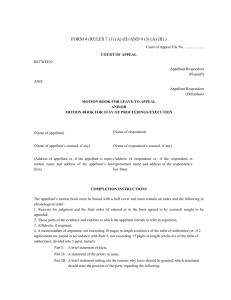
![[J-56A&B-2014][MO – Eakin, J.] IN THE SUPREME COURT OF](http://s3.studylib.net/store/data/008438149_1-ddd67f54580e54c004e3a347786df2e1-300x300.png)
